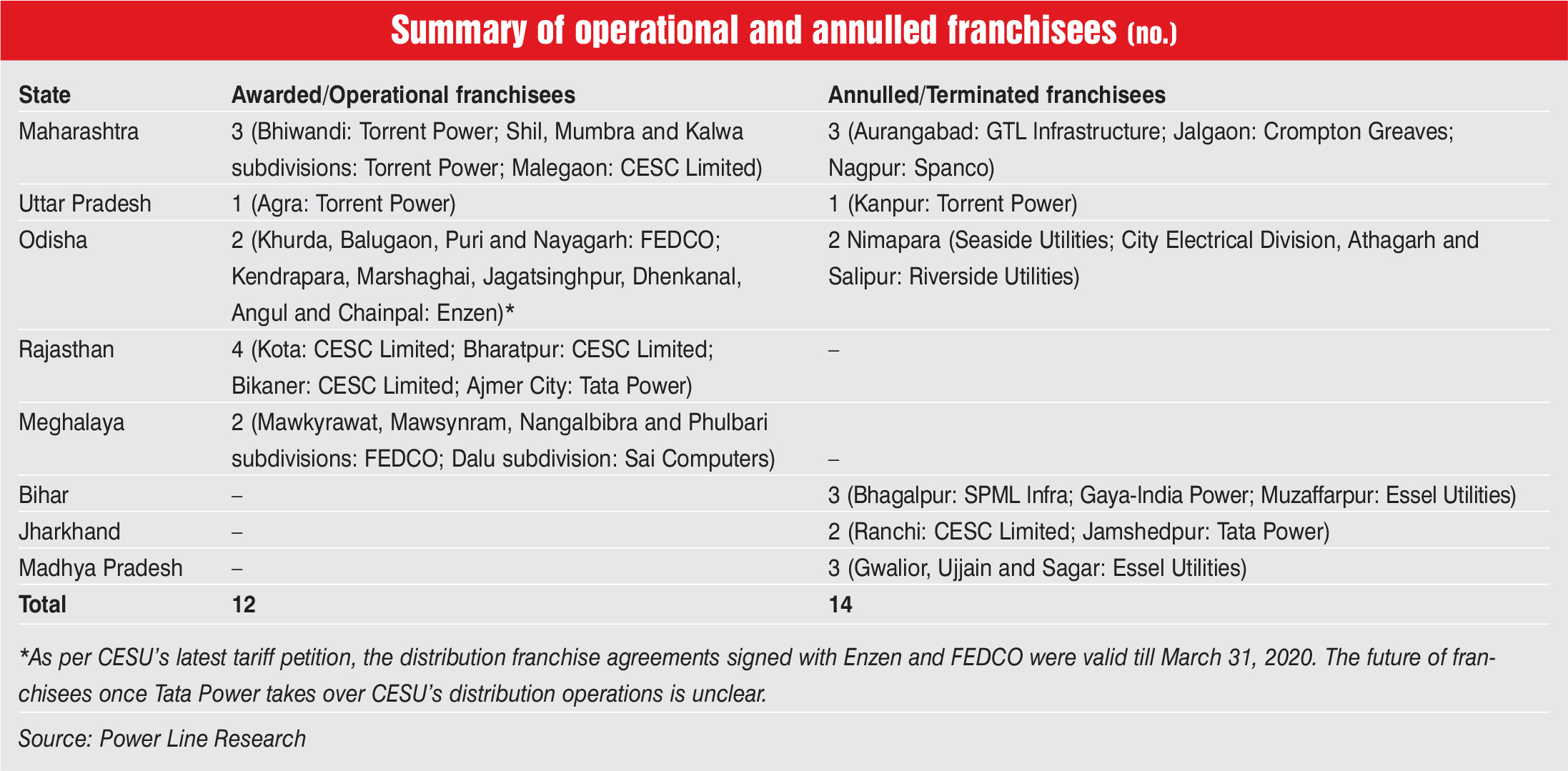The distribution franchise (DF) model is slowly gaining prominence in the power sector as the government is looking at it as a potential way to increase private participation. As per the recently released draft Electricity (Amendment) Bill, 2020, franchisee refers to an entity recognised as such and authorised by a distribution licensee to distribute electricity on its behalf in a particular area within its area of supply, under information to the appropriate state commission. So far, 26 franchises have been awarded by various state distribution utilities (see table). However, only 12 are operational at present, while the remaining 14 have been annulled/terminated/expired.
Status update
Currently, there are 12 operational franchisees in different circles/divisions across Maharashtra, Uttar Pradesh, Odisha, Rajasthan and Meghalaya. Bhiwandi in Maharashtra was the first DF to be awarded in the country, in 2006-07. TPL took over as the distribution franchisee for the Bhiwandi area from Maharashtra State Electricity Distribution Company Limited for a period of 10 years on January 26, 2007. The Bhiwandi DF is considered hugely successful as TPL managed to bring down the AT&C losses from 58 per cent at the time of the takeover (2006-07) to less than 20 per cent in five years. As of 2018-19, the AT&C losses in Bhiwandi stood at 14.9 per cent. In subsequent years, the DF model was adopted in Uttar Pradesh (TPL); in Odisha for Puri, Nayagarh, Khurda and Balugaon (FEDCO) and Kendrapara, Marshaghai, Jagatsinghpur, Dhenkanal, Angul and Chainpal (Enzen Global Solutions); and in Rajasthan for Kota, Bharatpur and Bikaner (CESC Limited) and Ajmer (Tata Power). All these areas have shown improved performance compared to the baseline. Certain DF contracts were cancelled/annulled owing to the inability to transfer distribution operations to the franchisee in a time-bound manner such as Kanpur (awarded to TPL) and Ranchi (CESC) and Jamshedpur (Tata Power) in Jharkhand. In certain places, DF contracts were cancelled owing to the inability of the franchisee to pay for input energy such as Aurangabad (GTL Infrastructure), Jalgaon (Crompton Greaves) and Nagpur (Spanco Limited) in Maharashtra, and Gaya in Bihar (SPML Infrastructure). Further, some DF contracts were terminated due to sub-par performance in Gwalior, Ujjain and Sagar in Madhya Pradesh (Essel Utilities), and Muzaffarpur in Bihar (Essel Vidyut Vitaran). Recently, DF contracts were awarded in Maharashtra and Meghalaya in 2019. The 20-year DF contract for Shil, Mumbra and Kalwa subdivisions (under Thane urban circle) in Maharashtra was awarded to TPL and the one for the Malegaon Corporation Area under the Malegaon circle to CESC Limited. Further, FEDCO signed a DF agreement with Meghalaya Power Distribution Corporation Limited for supplying electricity in – Mawkyrawat, Mawsynram, Nangalbibra and Phulbari – for 10 years. In addition, the DF contract for the Dalu subdivision was awarded to Sai Computers.
Challenges and the way forward
Although the DF model offers many benefits, it has not picked up at the expected pace. There is a need to revise the model DF agreement to address the concerns of private players as well as discoms.
